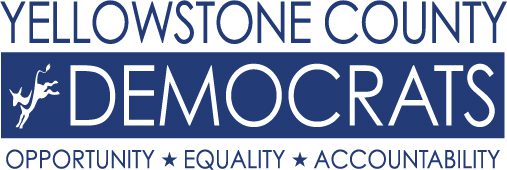You can build a stronger community, a little at a time. Here’s three things you can do this week, civil discourse edition.
1: Something to Talk About… with anyone!
Civil conversation is a powerful skill in both personal and public settings. Only when we bravely, consistently engage in thoughtful conversation, especially with people with whom we might disagree, we are able to build a stronger, more connected community and even, over time, change minds.
It’s a long game that creates positive change more resilient against the influence of news commentary and propaganda.
Yellowstone Democrats are committed to continuing these conversations, door to door, throughout the next year. If you’re not sure how to get involved, keep an eye out for future training events.
2: Something to Do: Ten Tips
USCourts.gov lists these 10 guidelines for maintaining professional, civil discussion. How many do you practice in unfamiliar or contentious conversations?
- Be mindful of your own behavior. Notice how you internally are reacting/responding when others speak. Pay attention to how your words and your silence are impacting the experience for others in the group.
What are you doing to create a welcoming environment for differing opinions? Are you looking at each speaker and giving your full attention? Are you listening with an open mind – momentarily putting aside what you will say next?
Are you asking clarifying questions? Are you being careful not to take over the conversation by talking longer than others? Are you refraining from subtle, but disrespectful behavior or not paying attention when others speak? - Wait to be recognized by the moderator before speaking. This allows time – before you speak – for reflection on what the previous speaker(s) have said.
- Don’t interrupt or talk over someone else who is speaking, even when you are excited.
No side conversations. They are disrespectful to the speaker and distract listeners from the person who has the floor. - No side conversations. They are disrespectful to the speaker and distract listeners from the person who has the floor.
- Listen for content in the statements of others, especially when you disagree. Listen for what the speakers are trying to communicate, even if they aren’t expressing their points concisely.
- Find common ground. Identify and call attention to areas of agreement.
- Follow the direction of the discussion. Don’t repeat what already has been said. Relate your comments to those of previous speakers.
- Ask questions. Don’t assume that you know what someone else means. Ask the speaker to help you understand perspectives different from your own.
- Don’t embarrass yourself or disrespect others by making demeaning or inappropriate comments, facial expressions, or gestures. No eye rolling, sighing, or checking out of the conversation.
- Differentiate between facts and opinions. Both are valid when expressed appropriately.
Vox’s article “How to talk someone out of Bigotry” lays out an achievable, scientifically proven method on, well, how to talk someone out of bigotry.
For more in-action examples of how to talk to people with whom you can’t imagine finding a connection, check out the award winning Conversations with People Who Hate Me Podcast with Dylan Marron
3: Something to Join
On note with this week’s topic, there a Civic Saturday event January 5 at the Billings pubic library
Also this week, in addition to the weekly Democratic Breakfast Study Club, the Billings County Commissioners has their regular meeting on Tuesday, as well as a variety of city community boards and neighborhood task forces.
Check out the 3 Things calendar for times, locations and agendas of what’s going on this week.
When you find a board or group that interests you, it’s good practice to read up on some basic Roberts Rules of Order, as well as the meeting agenda. Then observe how the meeting proceeds a few times to determine how you’d like to get more involved.
This is part of our weekly newsletter, “3 Things You Can Do” to help you build a stronger community through information on issues and opportunities to create connection in your neighborhood, on your own time. Each newsletter includes:
- Something to talk about: facts about a topic or issue that impacts our local community
- Something to do: a prompt for a small gesture to get out and connect with your family, friends and neighbors
- Something to join: opportunities to participate or lead in your local community
